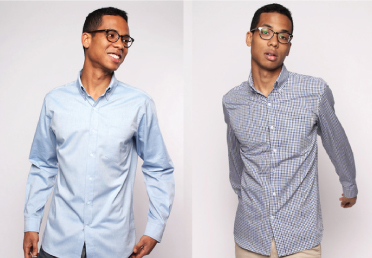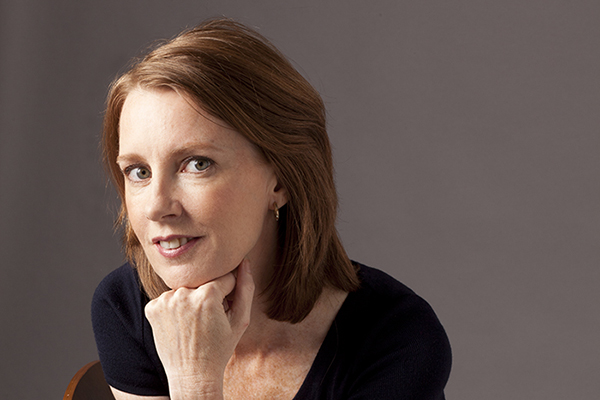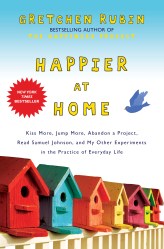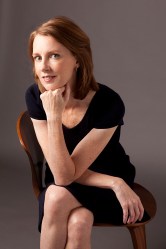
Gretchen Rubin: So happy, she can do it sitting down.
Gretchen Rubin has found the secret to happiness. OK, that may be overselling it a bit, but she’s made it her literal business to get closer to it through The Happiness Project. Initially a namesake best-selling book, it’s since morphed into a series of books (the latest: Happier At Home), a blog, a rapt online community, and an ongoing movement to unify science, psychology, and culture in the pursuit of deeper contentment. Of course, with such an amorphous destination, she’s learned the truism behind the cliché that it’s “more about the journey” — but maybe don’t use the J-word word around Rubin.
“Some people want to talk about a journey,” Rubin says. “Well, that’s not an idea that resonates with me — I love the idea of a project. That’s something that whets my appetite.”
Nervous supporters worried that her prescription for happiness might intimidate readers at the starting line; some equated the idea of a “project” with onerous homework. But Rubin, a Yale Law School graduate and former editor of the Yale Law Journal, opened her process to public dialogue and sought to engineer her methodology to apply to any personality type. That dialogue continues to this day on The Happiness Project.
“There’s no one right way to do it, because people are very different,” she says. “People have different vocabularies. I love making resolutions, and having lists, and charts — and for some people that would drive them crazy. But for some people it is about a journey — so you have to find the approach that works for you, the metaphor that works for you.”
We talked with Rubin over the phone about The Happiness Project, and how personal moves toward a happier life can lead to a better, healthier planet for everybody.
Q. What inspired this initial journey to tackle something as all-encompassing as happiness? How did you boil down tackling such a huge-sounding project?
A. I was stuck on a city bus in the pouring rain, and I thought, “What do I want from life, anyway? I want to be happy!” It hit me like a flash. So I went to the library and got this giant stack of books about happiness to figure out what I could do. It seemed very confusing in the beginning, because there’s a million different pieces, and everything’s tangled up with everything else. It was very intellectually challenging to figure out, where do I start and how do I do it in a systematic way. So I drilled down into things like home, possessions, body, neighborhood. Every month I focused on a different aspect of life and figured out what concrete resolutions I could do to make my experience of life happier.
Q. Were you predisposed to do this? For instance, you have a law degree, yet you made a definitive choice to be a writer — a choice that would seem to be informed by a move toward happiness.
A. Certainly that experience showed me you can make a change that will profoundly affect your life. It had a big effect on me. I was inclined to believe I could make my life happier.
When I started I was pretty happy — which is pretty true around the world. [If you look at studies], the majority of people say they are pretty happy. But I realized that I didn’t spend enough time thinking about if I could be happier, or even appreciating the happiness I already had.
Q. I think a lot of people might think of “being happy” as pure relaxation — lounging on a beach, say. But for you and your followers, it can seem like a much more engaged and active process than that.
A. It’s really a mindful examination of your life, your values, and your own interests. You have to find the approach that works for you, the metaphor that works for you. What truly makes you happy [or] unhappy? How would you bring that into your life? For someone like me, having a chart where I check it off is a great way to make sure I keep up with the things that I do. And for someone else, they might find a different way.
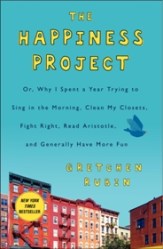
Rubin’s first book, The Happiness Project, spent more than two years atop The New York Times’ bestseller list.
Q. If someone is feeling stuck, where do they start to jump-start the process of finding a better way to personal happiness?
A. One thing that I see is that people are just exhausted. They train themselves into thinking they can get by on five hours of sleep and it’s just not true. They desperately need more sleep. That’s a very obvious thing, a very simple thing that you can be doing to your detriment year after year.
[Also,] one of the things that contemporary scientists and ancient philosophers agree about is that relationships are a key to happiness. In the end, that is what is the key thing for happiness. So when you’re getting started, anything that’s going to give you new relationships, or deepen existing ones, is something that’ll make you happy. If you’re thinking about joining a book group, or taking a college class, or seeing if someone that seems cool from work could become a good friend — if you put a little effort into it, those are the types of things that can really pay off.
Also, your home: It’s a huge part of our life. We all want to have the feeling that it’s a place of comfort, security, rest. [It’s a place of] engagement, but also solitude. It’s important to think, How could I change my experience of just being at home? It can be as simple as framing a poster you’ve had for two years, or making a shrine to France — whatever it might be that makes your home more comfortable and relaxing, more pleasant.
Q. Recently there’s been some work, through the Happiness Initiative and others, into getting policymakers to pay attention to happiness as a metric for success — moving away from “gross national product” to “gross national happiness.” Have you had any involvement or insight into that movement?
A. It’s the subject of a huge amount of study and activity — many people are fascinated by how you measure it, how would you understand how different cultures look at it, etc. I certainly think if people are happier they behave better and are more interested in the problems of the world and other people. But that for me is a justification why people should work on their own happiness. I’m very much focused on the individual — what could you do? Because that’s what’s really within our direct control. [Wider metrics are] important and valuable, but I’m interested in what you could do — what I could do — tomorrow. I’m very practical.
Q. You talk about William Butler Yeats inspiring your idea of “an atmosphere of growth” being essential to happiness: “Happiness is neither virtue nor pleasure nor this thing nor that, but simply growth. We are happy when we are growing.” You say that can include growing in monetary or material wealth. How do you separate that from pure consumerism, or a focus on negative material growth within the pursuit of happiness?
A. They are conflated. People will talk about desire for any object as materialism, when what they mean is an overemphasis on the power of objects to make us happy [or give us] prestige — which is clearly not something that makes us happy. On the other hand, I feel like many people who are focused on talking about materialism completely dismiss any role for possessions in a happy life. That is just not the common experience of mankind — look around. The common experience of mankind is that people are very engaged with possessions. Possessions allow us to project our identity into our environment, they are a reminder of the people and places and activities that we love. There’s a lot of aesthetic feeling tied up in objects.
One of the things about human nature is that when [humans] love something, they kind of want to own it. People go to museums, but people who love art who can afford it seem to buy it. There’s an impulse, and it’s not all about “materialism” — when we use that [term] in that negative way. I think [materialism can include] respect for beauty, wanting to claim something, or endorse it in a way. I think it’s very complicated. Ever since law school, I’ve been very interested in people’s relationship with objects and possessions. And so this has always been an interest of mine, and it’s only a small part of happiness, but it’s very complicated.
Q. How can people differentiate between those types of materialism?
A. People feel very worked up about the relationship between happiness and money, happiness and possessions. [But] for the average person, you don’t have to figure it out on a philosophical level. But you can ask yourself, “are my possessions making me happier or not?” I’ll probably be happier if I get rid of everything I don’t need, don’t use, don’t love, and I’m surrounded by things that I really use and want, and give everything else to someone else who can do a better job. I’ll be happier if I don’t use retail therapy as a way to change my mood, if I try to respect the environment, and my own budget, and not get carried away with it.
Q. You came up with an interesting phrase regarding this complex relationship to possessions — “spending out.” Can you tell me a bit more?
A. When I wrote about it, I thought I was the only one in the world who had this issue, but it turns out to be very common. I have a hoarding nature, where I’ll save things, or I won’t use them because I feel like I can’t risk that something would happen to them. “Spend out” reminds me that I should use things up and put things into circulation. That implies ideas, too. I used to have this impulse: “That’s a really great idea, so I have to hold that in reserve in case I need it.” Now I realize it’s better for creativity to always pour that out. Use it up, and that’s when you get more. I’ve learned to trust in that.
One woman told me a story about how when her mother died, they cleaned out the house and found a set of china that [the woman] had never seen in her entire life. Somehow no occasion was special enough for her mother to use that fancy china. So now she uses that china every day. Use it up, put it to work, let it break, let it run out. Another friend bought fancy truffle oil, saved it, and then it went bad. Holding things back needlessly is actually wasteful — it’s the same as throwing it away.
Q. I know you’ve read some of our own David Roberts’ idea of the medium chill — “stepping off the aspirational treadmill, forgoing some material opportunities and accepting some material constraints in exchange for more time to spend on relationships and experiences.” How does this square with The Happiness Project?
A. One thing I caution against is false choices. I can work all the time, sacrifice my relationships, and have a lot of money, material goods, and success; or I can have healthy relationships, but abandon my ambition and settle for “good enough,” and work less. Is that the only choice? Is that the only way to do it? I don’t think so. I think there are plenty of people who have very strong relationships with family and friends and are also ambitious and successful. It’s true that it’s easier in some professions than in others, and easier for some people more than others. I’m always very wary when it’s like “I can have a few close friends or a lot of superficial friends.” Is that the only choice?
Often, when you look at people who are very high-performing, they tend to be the people who are very disciplined about taking time for relationships, taking time for travel, taking time for hobbies. You read about these crazy super-successful people, and they often have world-class art collections and are constantly jetting around. I don’t have energy to leave my neighborhood — how do these people found giant foundations and get involved in all these things? I think you have to be cautious when you pose a two-track possibility, because life is not like that. It’s not that simple. “I can get married now, or be alone for the rest of my whole life.”
Find out more at the Happiness Project website or on Twitter, Facebook, or YouTube.
